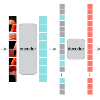Deep neural networks are vulnerable to backdoor attacks, where an adversary maliciously manipulates the model behavior through overlaying images with special triggers. Existing backdoor defense methods often require accessing a few validation data and model parameters, which are impractical in many real-world applications, e.g., when the model is provided as a cloud service. In this paper, we address the practical task of blind backdoor defense at test time, in particular for black-box models. The true label of every test image needs to be recovered on the fly from a suspicious model regardless of image benignity. We focus on test-time image purification methods that incapacitate possible triggers while keeping semantic contents intact. Due to diverse trigger patterns and sizes, the heuristic trigger search in image space can be unscalable. We circumvent such barrier by leveraging the strong reconstruction power of generative models, and propose a framework of Blind Defense with Masked AutoEncoder (BDMAE). It detects possible triggers in the token space using image structural similarity and label consistency between the test image and MAE restorations. The detection results are then refined by considering trigger topology. Finally, we fuse MAE restorations adaptively into a purified image for making prediction. Our approach is blind to the model architectures, trigger patterns and image benignity. Extensive experiments under different backdoor settings validate its effectiveness and generalizability. Code is available at https://github.com/tsun/BDMAE.
翻译:暂无翻译




